Impact of Imperialism on Family Structures
VerifiedAdded on 2020/10/07
|9
|3582
|236
AI Summary
This assignment explores the impact of imperialism on family structures, highlighting changes in women's roles, the addition of grandparents or domestic helpers to basic family units, and the influence of capitalism on world systems. The essay draws from various sources, including sociology, history, and literature, to provide a comprehensive understanding of how imperialism has shaped modern family structures.
Contribute Materials
Your contribution can guide someone’s learning journey. Share your
documents today.
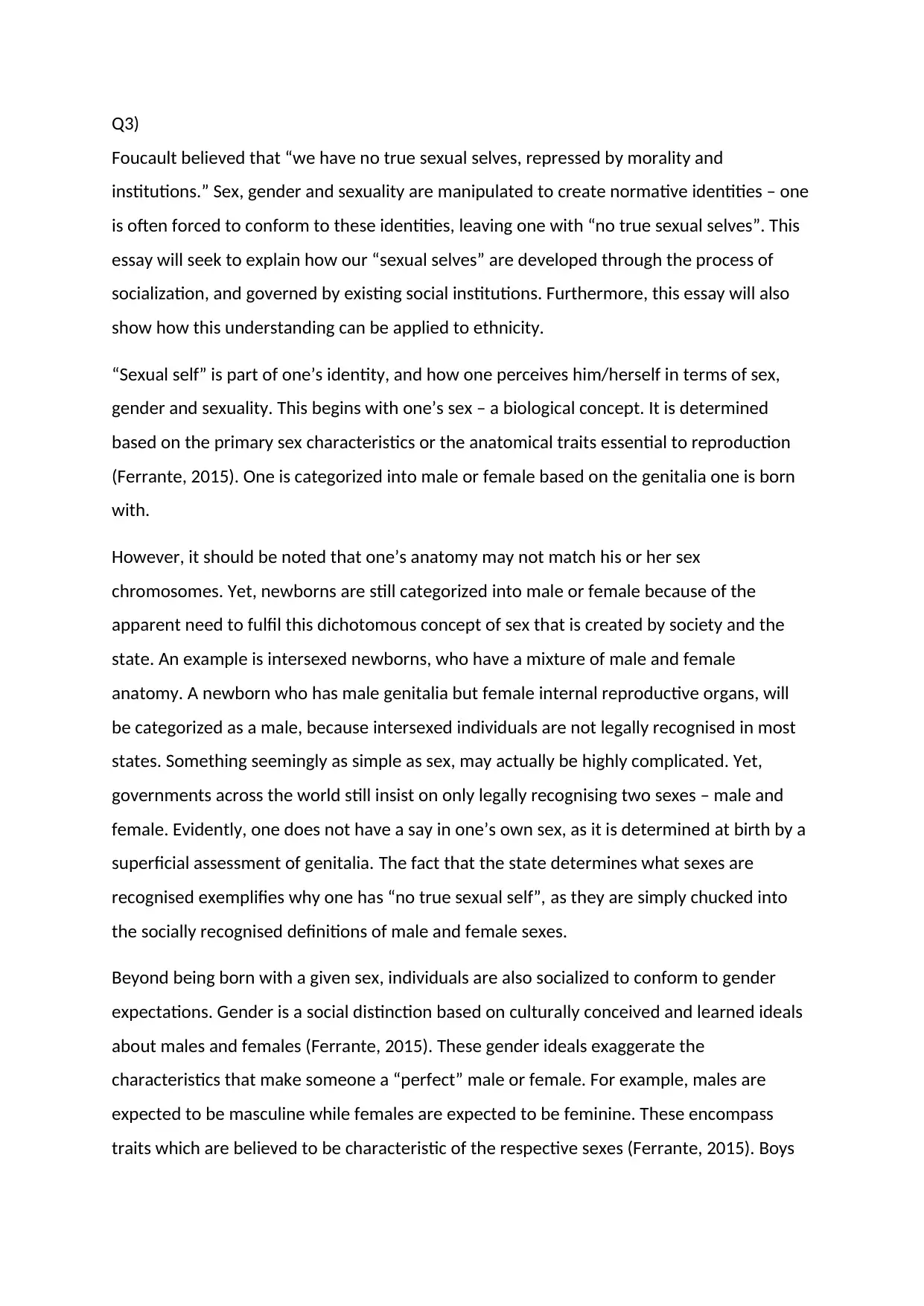
Q3)
Foucault believed that “we have no true sexual selves, repressed by morality and
institutions.” Sex, gender and sexuality are manipulated to create normative identities – one
is often forced to conform to these identities, leaving one with “no true sexual selves”. This
essay will seek to explain how our “sexual selves” are developed through the process of
socialization, and governed by existing social institutions. Furthermore, this essay will also
show how this understanding can be applied to ethnicity.
“Sexual self” is part of one’s identity, and how one perceives him/herself in terms of sex,
gender and sexuality. This begins with one’s sex – a biological concept. It is determined
based on the primary sex characteristics or the anatomical traits essential to reproduction
(Ferrante, 2015). One is categorized into male or female based on the genitalia one is born
with.
However, it should be noted that one’s anatomy may not match his or her sex
chromosomes. Yet, newborns are still categorized into male or female because of the
apparent need to fulfil this dichotomous concept of sex that is created by society and the
state. An example is intersexed newborns, who have a mixture of male and female
anatomy. A newborn who has male genitalia but female internal reproductive organs, will
be categorized as a male, because intersexed individuals are not legally recognised in most
states. Something seemingly as simple as sex, may actually be highly complicated. Yet,
governments across the world still insist on only legally recognising two sexes – male and
female. Evidently, one does not have a say in one’s own sex, as it is determined at birth by a
superficial assessment of genitalia. The fact that the state determines what sexes are
recognised exemplifies why one has “no true sexual self”, as they are simply chucked into
the socially recognised definitions of male and female sexes.
Beyond being born with a given sex, individuals are also socialized to conform to gender
expectations. Gender is a social distinction based on culturally conceived and learned ideals
about males and females (Ferrante, 2015). These gender ideals exaggerate the
characteristics that make someone a “perfect” male or female. For example, males are
expected to be masculine while females are expected to be feminine. These encompass
traits which are believed to be characteristic of the respective sexes (Ferrante, 2015). Boys
Foucault believed that “we have no true sexual selves, repressed by morality and
institutions.” Sex, gender and sexuality are manipulated to create normative identities – one
is often forced to conform to these identities, leaving one with “no true sexual selves”. This
essay will seek to explain how our “sexual selves” are developed through the process of
socialization, and governed by existing social institutions. Furthermore, this essay will also
show how this understanding can be applied to ethnicity.
“Sexual self” is part of one’s identity, and how one perceives him/herself in terms of sex,
gender and sexuality. This begins with one’s sex – a biological concept. It is determined
based on the primary sex characteristics or the anatomical traits essential to reproduction
(Ferrante, 2015). One is categorized into male or female based on the genitalia one is born
with.
However, it should be noted that one’s anatomy may not match his or her sex
chromosomes. Yet, newborns are still categorized into male or female because of the
apparent need to fulfil this dichotomous concept of sex that is created by society and the
state. An example is intersexed newborns, who have a mixture of male and female
anatomy. A newborn who has male genitalia but female internal reproductive organs, will
be categorized as a male, because intersexed individuals are not legally recognised in most
states. Something seemingly as simple as sex, may actually be highly complicated. Yet,
governments across the world still insist on only legally recognising two sexes – male and
female. Evidently, one does not have a say in one’s own sex, as it is determined at birth by a
superficial assessment of genitalia. The fact that the state determines what sexes are
recognised exemplifies why one has “no true sexual self”, as they are simply chucked into
the socially recognised definitions of male and female sexes.
Beyond being born with a given sex, individuals are also socialized to conform to gender
expectations. Gender is a social distinction based on culturally conceived and learned ideals
about males and females (Ferrante, 2015). These gender ideals exaggerate the
characteristics that make someone a “perfect” male or female. For example, males are
expected to be masculine while females are expected to be feminine. These encompass
traits which are believed to be characteristic of the respective sexes (Ferrante, 2015). Boys
Secure Best Marks with AI Grader
Need help grading? Try our AI Grader for instant feedback on your assignments.
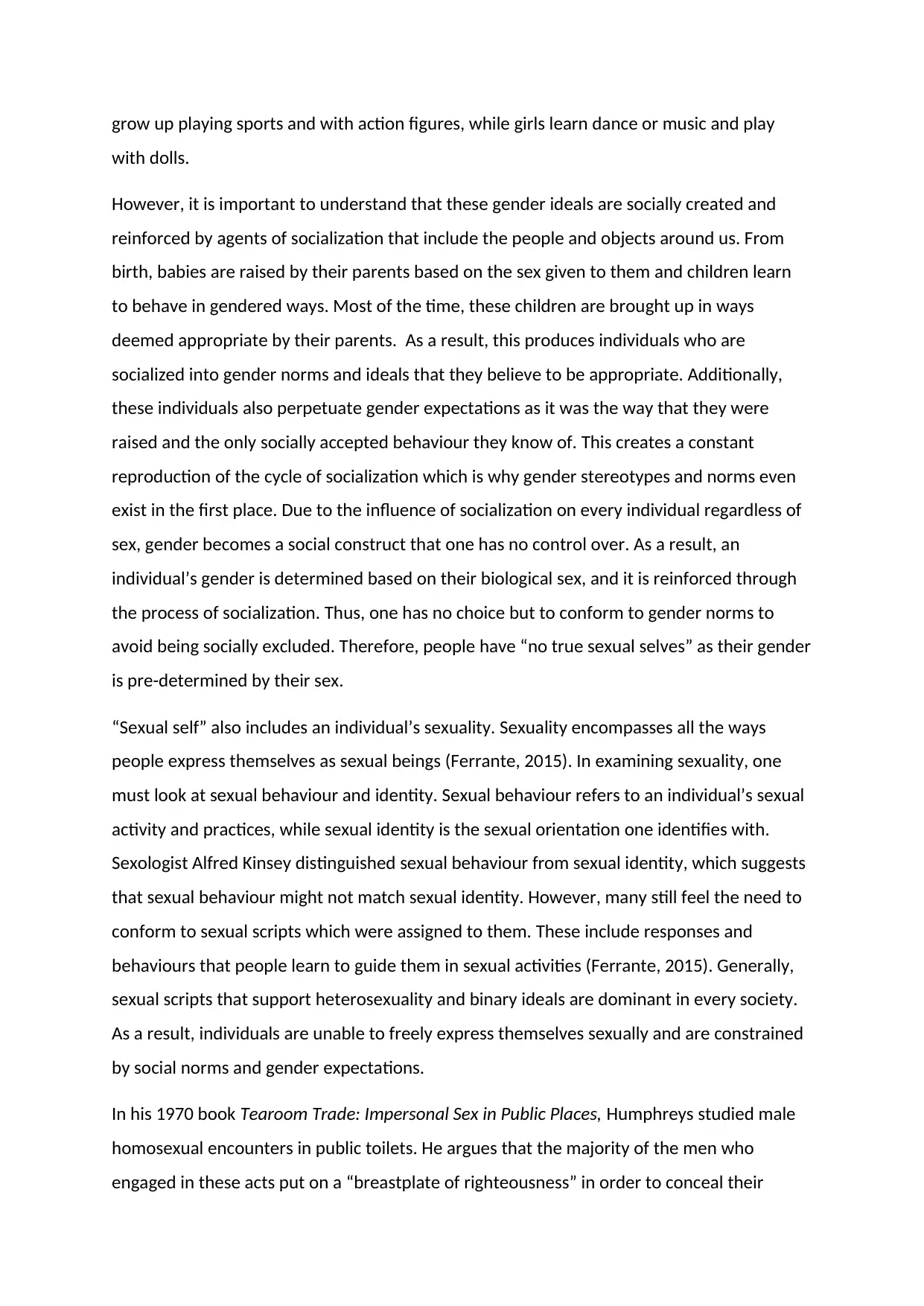
grow up playing sports and with action figures, while girls learn dance or music and play
with dolls.
However, it is important to understand that these gender ideals are socially created and
reinforced by agents of socialization that include the people and objects around us. From
birth, babies are raised by their parents based on the sex given to them and children learn
to behave in gendered ways. Most of the time, these children are brought up in ways
deemed appropriate by their parents. As a result, this produces individuals who are
socialized into gender norms and ideals that they believe to be appropriate. Additionally,
these individuals also perpetuate gender expectations as it was the way that they were
raised and the only socially accepted behaviour they know of. This creates a constant
reproduction of the cycle of socialization which is why gender stereotypes and norms even
exist in the first place. Due to the influence of socialization on every individual regardless of
sex, gender becomes a social construct that one has no control over. As a result, an
individual’s gender is determined based on their biological sex, and it is reinforced through
the process of socialization. Thus, one has no choice but to conform to gender norms to
avoid being socially excluded. Therefore, people have “no true sexual selves” as their gender
is pre-determined by their sex.
“Sexual self” also includes an individual’s sexuality. Sexuality encompasses all the ways
people express themselves as sexual beings (Ferrante, 2015). In examining sexuality, one
must look at sexual behaviour and identity. Sexual behaviour refers to an individual’s sexual
activity and practices, while sexual identity is the sexual orientation one identifies with.
Sexologist Alfred Kinsey distinguished sexual behaviour from sexual identity, which suggests
that sexual behaviour might not match sexual identity. However, many still feel the need to
conform to sexual scripts which were assigned to them. These include responses and
behaviours that people learn to guide them in sexual activities (Ferrante, 2015). Generally,
sexual scripts that support heterosexuality and binary ideals are dominant in every society.
As a result, individuals are unable to freely express themselves sexually and are constrained
by social norms and gender expectations.
In his 1970 book Tearoom Trade: Impersonal Sex in Public Places, Humphreys studied male
homosexual encounters in public toilets. He argues that the majority of the men who
engaged in these acts put on a “breastplate of righteousness” in order to conceal their
with dolls.
However, it is important to understand that these gender ideals are socially created and
reinforced by agents of socialization that include the people and objects around us. From
birth, babies are raised by their parents based on the sex given to them and children learn
to behave in gendered ways. Most of the time, these children are brought up in ways
deemed appropriate by their parents. As a result, this produces individuals who are
socialized into gender norms and ideals that they believe to be appropriate. Additionally,
these individuals also perpetuate gender expectations as it was the way that they were
raised and the only socially accepted behaviour they know of. This creates a constant
reproduction of the cycle of socialization which is why gender stereotypes and norms even
exist in the first place. Due to the influence of socialization on every individual regardless of
sex, gender becomes a social construct that one has no control over. As a result, an
individual’s gender is determined based on their biological sex, and it is reinforced through
the process of socialization. Thus, one has no choice but to conform to gender norms to
avoid being socially excluded. Therefore, people have “no true sexual selves” as their gender
is pre-determined by their sex.
“Sexual self” also includes an individual’s sexuality. Sexuality encompasses all the ways
people express themselves as sexual beings (Ferrante, 2015). In examining sexuality, one
must look at sexual behaviour and identity. Sexual behaviour refers to an individual’s sexual
activity and practices, while sexual identity is the sexual orientation one identifies with.
Sexologist Alfred Kinsey distinguished sexual behaviour from sexual identity, which suggests
that sexual behaviour might not match sexual identity. However, many still feel the need to
conform to sexual scripts which were assigned to them. These include responses and
behaviours that people learn to guide them in sexual activities (Ferrante, 2015). Generally,
sexual scripts that support heterosexuality and binary ideals are dominant in every society.
As a result, individuals are unable to freely express themselves sexually and are constrained
by social norms and gender expectations.
In his 1970 book Tearoom Trade: Impersonal Sex in Public Places, Humphreys studied male
homosexual encounters in public toilets. He argues that the majority of the men who
engaged in these acts put on a “breastplate of righteousness” in order to conceal their
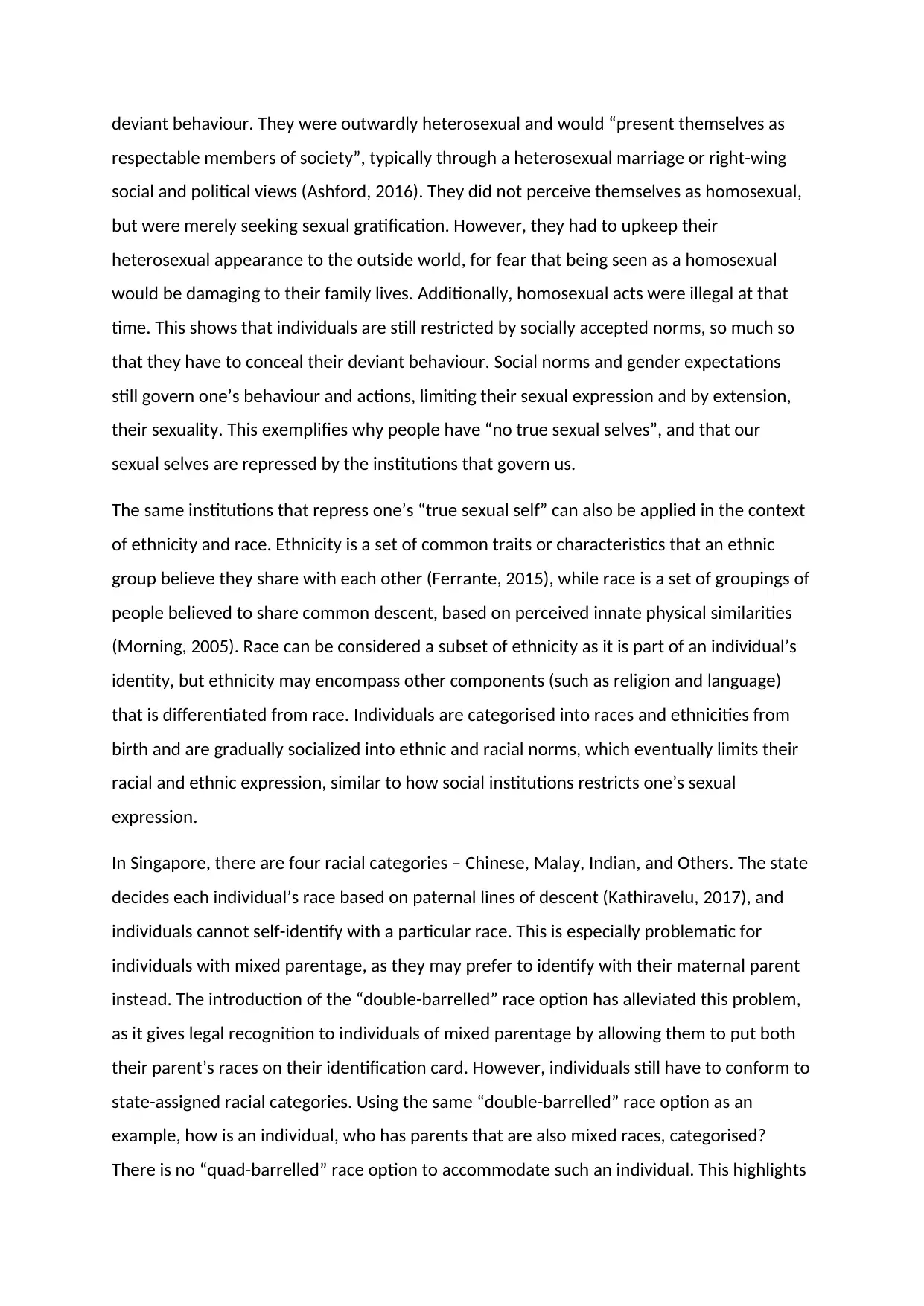
deviant behaviour. They were outwardly heterosexual and would “present themselves as
respectable members of society”, typically through a heterosexual marriage or right-wing
social and political views (Ashford, 2016). They did not perceive themselves as homosexual,
but were merely seeking sexual gratification. However, they had to upkeep their
heterosexual appearance to the outside world, for fear that being seen as a homosexual
would be damaging to their family lives. Additionally, homosexual acts were illegal at that
time. This shows that individuals are still restricted by socially accepted norms, so much so
that they have to conceal their deviant behaviour. Social norms and gender expectations
still govern one’s behaviour and actions, limiting their sexual expression and by extension,
their sexuality. This exemplifies why people have “no true sexual selves”, and that our
sexual selves are repressed by the institutions that govern us.
The same institutions that repress one’s “true sexual self” can also be applied in the context
of ethnicity and race. Ethnicity is a set of common traits or characteristics that an ethnic
group believe they share with each other (Ferrante, 2015), while race is a set of groupings of
people believed to share common descent, based on perceived innate physical similarities
(Morning, 2005). Race can be considered a subset of ethnicity as it is part of an individual’s
identity, but ethnicity may encompass other components (such as religion and language)
that is differentiated from race. Individuals are categorised into races and ethnicities from
birth and are gradually socialized into ethnic and racial norms, which eventually limits their
racial and ethnic expression, similar to how social institutions restricts one’s sexual
expression.
In Singapore, there are four racial categories – Chinese, Malay, Indian, and Others. The state
decides each individual’s race based on paternal lines of descent (Kathiravelu, 2017), and
individuals cannot self-identify with a particular race. This is especially problematic for
individuals with mixed parentage, as they may prefer to identify with their maternal parent
instead. The introduction of the “double-barrelled” race option has alleviated this problem,
as it gives legal recognition to individuals of mixed parentage by allowing them to put both
their parent’s races on their identification card. However, individuals still have to conform to
state-assigned racial categories. Using the same “double-barrelled” race option as an
example, how is an individual, who has parents that are also mixed races, categorised?
There is no “quad-barrelled” race option to accommodate such an individual. This highlights
respectable members of society”, typically through a heterosexual marriage or right-wing
social and political views (Ashford, 2016). They did not perceive themselves as homosexual,
but were merely seeking sexual gratification. However, they had to upkeep their
heterosexual appearance to the outside world, for fear that being seen as a homosexual
would be damaging to their family lives. Additionally, homosexual acts were illegal at that
time. This shows that individuals are still restricted by socially accepted norms, so much so
that they have to conceal their deviant behaviour. Social norms and gender expectations
still govern one’s behaviour and actions, limiting their sexual expression and by extension,
their sexuality. This exemplifies why people have “no true sexual selves”, and that our
sexual selves are repressed by the institutions that govern us.
The same institutions that repress one’s “true sexual self” can also be applied in the context
of ethnicity and race. Ethnicity is a set of common traits or characteristics that an ethnic
group believe they share with each other (Ferrante, 2015), while race is a set of groupings of
people believed to share common descent, based on perceived innate physical similarities
(Morning, 2005). Race can be considered a subset of ethnicity as it is part of an individual’s
identity, but ethnicity may encompass other components (such as religion and language)
that is differentiated from race. Individuals are categorised into races and ethnicities from
birth and are gradually socialized into ethnic and racial norms, which eventually limits their
racial and ethnic expression, similar to how social institutions restricts one’s sexual
expression.
In Singapore, there are four racial categories – Chinese, Malay, Indian, and Others. The state
decides each individual’s race based on paternal lines of descent (Kathiravelu, 2017), and
individuals cannot self-identify with a particular race. This is especially problematic for
individuals with mixed parentage, as they may prefer to identify with their maternal parent
instead. The introduction of the “double-barrelled” race option has alleviated this problem,
as it gives legal recognition to individuals of mixed parentage by allowing them to put both
their parent’s races on their identification card. However, individuals still have to conform to
state-assigned racial categories. Using the same “double-barrelled” race option as an
example, how is an individual, who has parents that are also mixed races, categorised?
There is no “quad-barrelled” race option to accommodate such an individual. This highlights
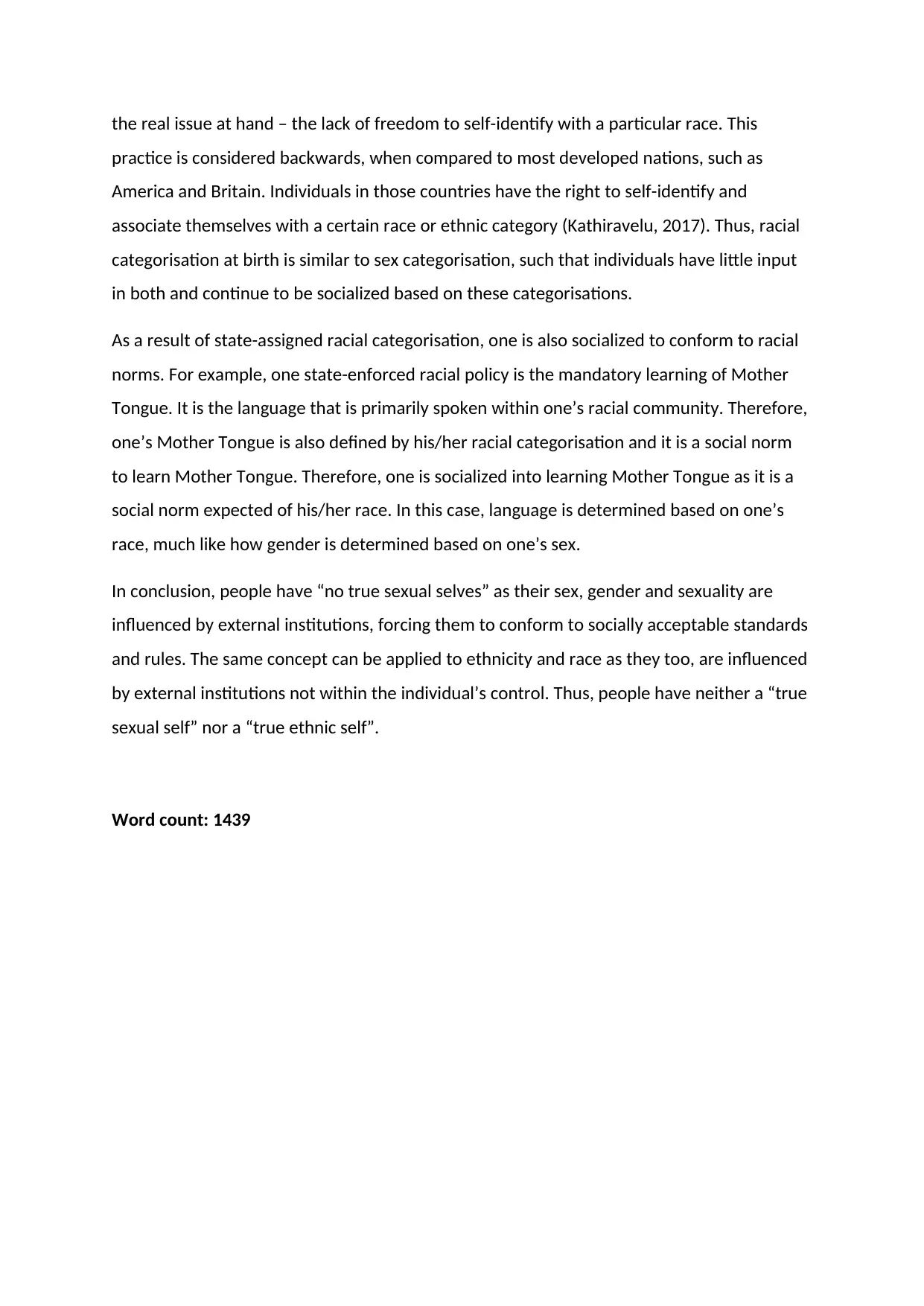
the real issue at hand – the lack of freedom to self-identify with a particular race. This
practice is considered backwards, when compared to most developed nations, such as
America and Britain. Individuals in those countries have the right to self-identify and
associate themselves with a certain race or ethnic category (Kathiravelu, 2017). Thus, racial
categorisation at birth is similar to sex categorisation, such that individuals have little input
in both and continue to be socialized based on these categorisations.
As a result of state-assigned racial categorisation, one is also socialized to conform to racial
norms. For example, one state-enforced racial policy is the mandatory learning of Mother
Tongue. It is the language that is primarily spoken within one’s racial community. Therefore,
one’s Mother Tongue is also defined by his/her racial categorisation and it is a social norm
to learn Mother Tongue. Therefore, one is socialized into learning Mother Tongue as it is a
social norm expected of his/her race. In this case, language is determined based on one’s
race, much like how gender is determined based on one’s sex.
In conclusion, people have “no true sexual selves” as their sex, gender and sexuality are
influenced by external institutions, forcing them to conform to socially acceptable standards
and rules. The same concept can be applied to ethnicity and race as they too, are influenced
by external institutions not within the individual’s control. Thus, people have neither a “true
sexual self” nor a “true ethnic self”.
Word count: 1439
practice is considered backwards, when compared to most developed nations, such as
America and Britain. Individuals in those countries have the right to self-identify and
associate themselves with a certain race or ethnic category (Kathiravelu, 2017). Thus, racial
categorisation at birth is similar to sex categorisation, such that individuals have little input
in both and continue to be socialized based on these categorisations.
As a result of state-assigned racial categorisation, one is also socialized to conform to racial
norms. For example, one state-enforced racial policy is the mandatory learning of Mother
Tongue. It is the language that is primarily spoken within one’s racial community. Therefore,
one’s Mother Tongue is also defined by his/her racial categorisation and it is a social norm
to learn Mother Tongue. Therefore, one is socialized into learning Mother Tongue as it is a
social norm expected of his/her race. In this case, language is determined based on one’s
race, much like how gender is determined based on one’s sex.
In conclusion, people have “no true sexual selves” as their sex, gender and sexuality are
influenced by external institutions, forcing them to conform to socially acceptable standards
and rules. The same concept can be applied to ethnicity and race as they too, are influenced
by external institutions not within the individual’s control. Thus, people have neither a “true
sexual self” nor a “true ethnic self”.
Word count: 1439
Secure Best Marks with AI Grader
Need help grading? Try our AI Grader for instant feedback on your assignments.
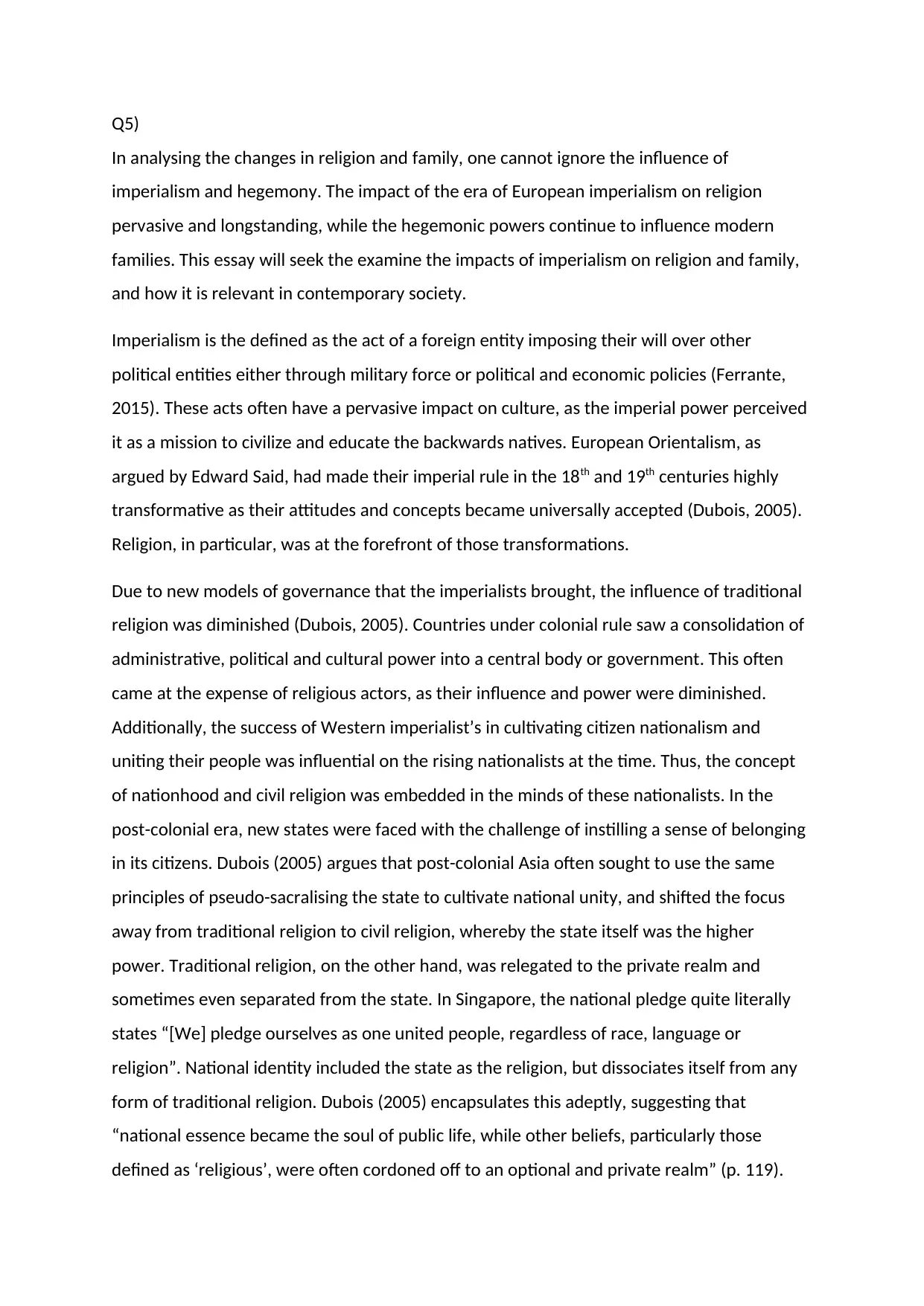
Q5)
In analysing the changes in religion and family, one cannot ignore the influence of
imperialism and hegemony. The impact of the era of European imperialism on religion
pervasive and longstanding, while the hegemonic powers continue to influence modern
families. This essay will seek the examine the impacts of imperialism on religion and family,
and how it is relevant in contemporary society.
Imperialism is the defined as the act of a foreign entity imposing their will over other
political entities either through military force or political and economic policies (Ferrante,
2015). These acts often have a pervasive impact on culture, as the imperial power perceived
it as a mission to civilize and educate the backwards natives. European Orientalism, as
argued by Edward Said, had made their imperial rule in the 18th and 19th centuries highly
transformative as their attitudes and concepts became universally accepted (Dubois, 2005).
Religion, in particular, was at the forefront of those transformations.
Due to new models of governance that the imperialists brought, the influence of traditional
religion was diminished (Dubois, 2005). Countries under colonial rule saw a consolidation of
administrative, political and cultural power into a central body or government. This often
came at the expense of religious actors, as their influence and power were diminished.
Additionally, the success of Western imperialist’s in cultivating citizen nationalism and
uniting their people was influential on the rising nationalists at the time. Thus, the concept
of nationhood and civil religion was embedded in the minds of these nationalists. In the
post-colonial era, new states were faced with the challenge of instilling a sense of belonging
in its citizens. Dubois (2005) argues that post-colonial Asia often sought to use the same
principles of pseudo-sacralising the state to cultivate national unity, and shifted the focus
away from traditional religion to civil religion, whereby the state itself was the higher
power. Traditional religion, on the other hand, was relegated to the private realm and
sometimes even separated from the state. In Singapore, the national pledge quite literally
states “[We] pledge ourselves as one united people, regardless of race, language or
religion”. National identity included the state as the religion, but dissociates itself from any
form of traditional religion. Dubois (2005) encapsulates this adeptly, suggesting that
“national essence became the soul of public life, while other beliefs, particularly those
defined as ‘religious’, were often cordoned off to an optional and private realm” (p. 119).
In analysing the changes in religion and family, one cannot ignore the influence of
imperialism and hegemony. The impact of the era of European imperialism on religion
pervasive and longstanding, while the hegemonic powers continue to influence modern
families. This essay will seek the examine the impacts of imperialism on religion and family,
and how it is relevant in contemporary society.
Imperialism is the defined as the act of a foreign entity imposing their will over other
political entities either through military force or political and economic policies (Ferrante,
2015). These acts often have a pervasive impact on culture, as the imperial power perceived
it as a mission to civilize and educate the backwards natives. European Orientalism, as
argued by Edward Said, had made their imperial rule in the 18th and 19th centuries highly
transformative as their attitudes and concepts became universally accepted (Dubois, 2005).
Religion, in particular, was at the forefront of those transformations.
Due to new models of governance that the imperialists brought, the influence of traditional
religion was diminished (Dubois, 2005). Countries under colonial rule saw a consolidation of
administrative, political and cultural power into a central body or government. This often
came at the expense of religious actors, as their influence and power were diminished.
Additionally, the success of Western imperialist’s in cultivating citizen nationalism and
uniting their people was influential on the rising nationalists at the time. Thus, the concept
of nationhood and civil religion was embedded in the minds of these nationalists. In the
post-colonial era, new states were faced with the challenge of instilling a sense of belonging
in its citizens. Dubois (2005) argues that post-colonial Asia often sought to use the same
principles of pseudo-sacralising the state to cultivate national unity, and shifted the focus
away from traditional religion to civil religion, whereby the state itself was the higher
power. Traditional religion, on the other hand, was relegated to the private realm and
sometimes even separated from the state. In Singapore, the national pledge quite literally
states “[We] pledge ourselves as one united people, regardless of race, language or
religion”. National identity included the state as the religion, but dissociates itself from any
form of traditional religion. Dubois (2005) encapsulates this adeptly, suggesting that
“national essence became the soul of public life, while other beliefs, particularly those
defined as ‘religious’, were often cordoned off to an optional and private realm” (p. 119).
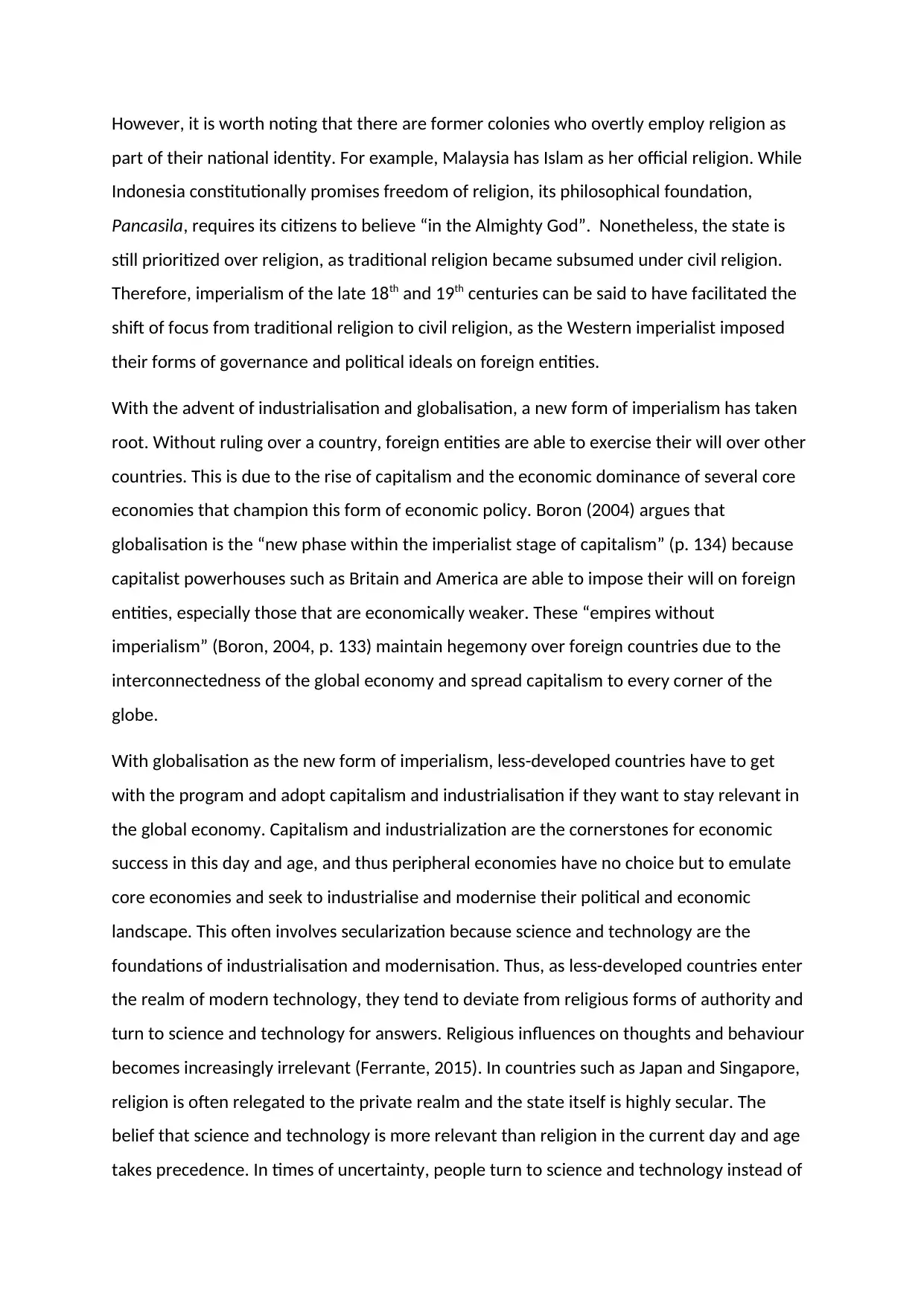
However, it is worth noting that there are former colonies who overtly employ religion as
part of their national identity. For example, Malaysia has Islam as her official religion. While
Indonesia constitutionally promises freedom of religion, its philosophical foundation,
Pancasila, requires its citizens to believe “in the Almighty God”. Nonetheless, the state is
still prioritized over religion, as traditional religion became subsumed under civil religion.
Therefore, imperialism of the late 18th and 19th centuries can be said to have facilitated the
shift of focus from traditional religion to civil religion, as the Western imperialist imposed
their forms of governance and political ideals on foreign entities.
With the advent of industrialisation and globalisation, a new form of imperialism has taken
root. Without ruling over a country, foreign entities are able to exercise their will over other
countries. This is due to the rise of capitalism and the economic dominance of several core
economies that champion this form of economic policy. Boron (2004) argues that
globalisation is the “new phase within the imperialist stage of capitalism” (p. 134) because
capitalist powerhouses such as Britain and America are able to impose their will on foreign
entities, especially those that are economically weaker. These “empires without
imperialism” (Boron, 2004, p. 133) maintain hegemony over foreign countries due to the
interconnectedness of the global economy and spread capitalism to every corner of the
globe.
With globalisation as the new form of imperialism, less-developed countries have to get
with the program and adopt capitalism and industrialisation if they want to stay relevant in
the global economy. Capitalism and industrialization are the cornerstones for economic
success in this day and age, and thus peripheral economies have no choice but to emulate
core economies and seek to industrialise and modernise their political and economic
landscape. This often involves secularization because science and technology are the
foundations of industrialisation and modernisation. Thus, as less-developed countries enter
the realm of modern technology, they tend to deviate from religious forms of authority and
turn to science and technology for answers. Religious influences on thoughts and behaviour
becomes increasingly irrelevant (Ferrante, 2015). In countries such as Japan and Singapore,
religion is often relegated to the private realm and the state itself is highly secular. The
belief that science and technology is more relevant than religion in the current day and age
takes precedence. In times of uncertainty, people turn to science and technology instead of
part of their national identity. For example, Malaysia has Islam as her official religion. While
Indonesia constitutionally promises freedom of religion, its philosophical foundation,
Pancasila, requires its citizens to believe “in the Almighty God”. Nonetheless, the state is
still prioritized over religion, as traditional religion became subsumed under civil religion.
Therefore, imperialism of the late 18th and 19th centuries can be said to have facilitated the
shift of focus from traditional religion to civil religion, as the Western imperialist imposed
their forms of governance and political ideals on foreign entities.
With the advent of industrialisation and globalisation, a new form of imperialism has taken
root. Without ruling over a country, foreign entities are able to exercise their will over other
countries. This is due to the rise of capitalism and the economic dominance of several core
economies that champion this form of economic policy. Boron (2004) argues that
globalisation is the “new phase within the imperialist stage of capitalism” (p. 134) because
capitalist powerhouses such as Britain and America are able to impose their will on foreign
entities, especially those that are economically weaker. These “empires without
imperialism” (Boron, 2004, p. 133) maintain hegemony over foreign countries due to the
interconnectedness of the global economy and spread capitalism to every corner of the
globe.
With globalisation as the new form of imperialism, less-developed countries have to get
with the program and adopt capitalism and industrialisation if they want to stay relevant in
the global economy. Capitalism and industrialization are the cornerstones for economic
success in this day and age, and thus peripheral economies have no choice but to emulate
core economies and seek to industrialise and modernise their political and economic
landscape. This often involves secularization because science and technology are the
foundations of industrialisation and modernisation. Thus, as less-developed countries enter
the realm of modern technology, they tend to deviate from religious forms of authority and
turn to science and technology for answers. Religious influences on thoughts and behaviour
becomes increasingly irrelevant (Ferrante, 2015). In countries such as Japan and Singapore,
religion is often relegated to the private realm and the state itself is highly secular. The
belief that science and technology is more relevant than religion in the current day and age
takes precedence. In times of uncertainty, people turn to science and technology instead of
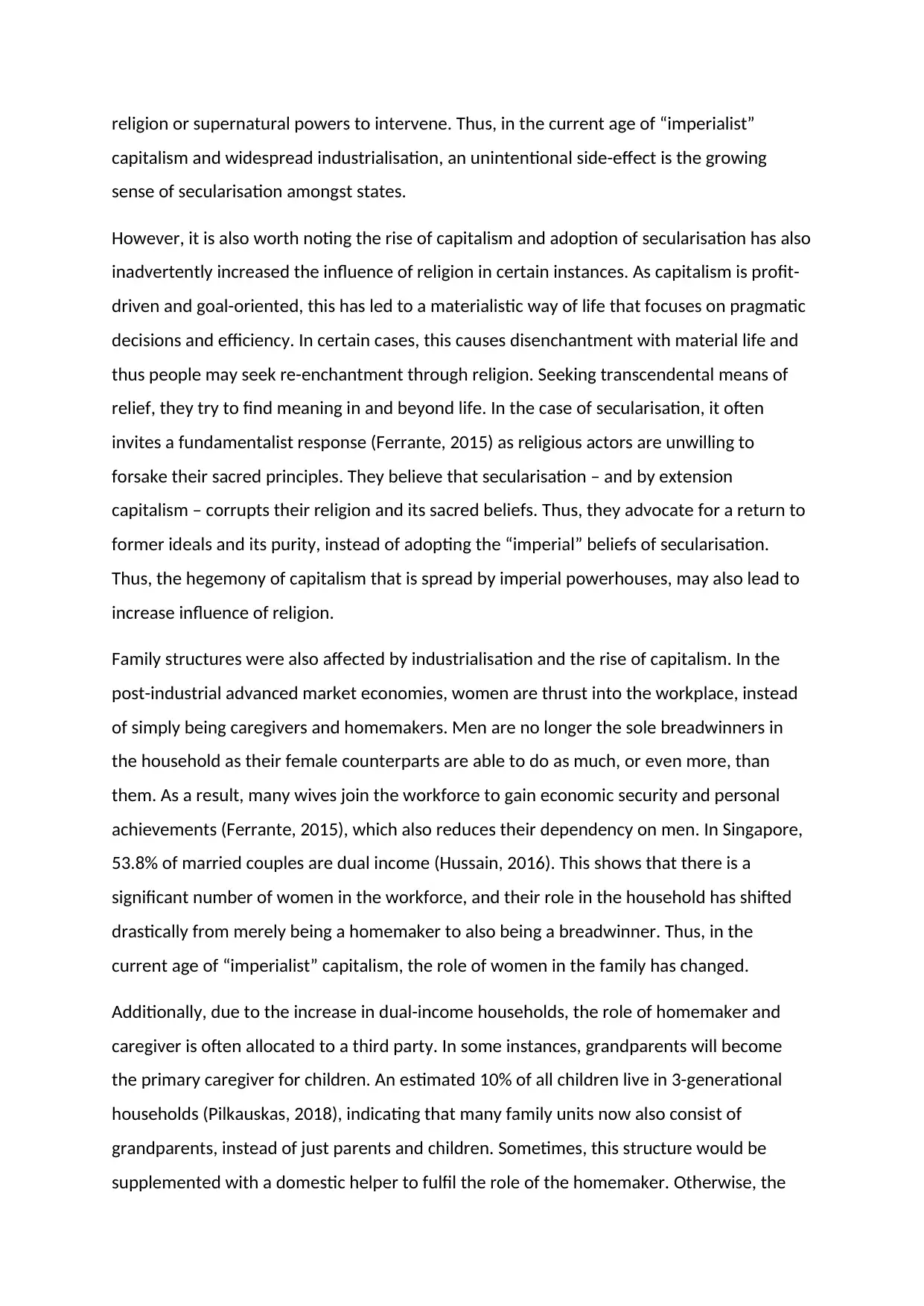
religion or supernatural powers to intervene. Thus, in the current age of “imperialist”
capitalism and widespread industrialisation, an unintentional side-effect is the growing
sense of secularisation amongst states.
However, it is also worth noting the rise of capitalism and adoption of secularisation has also
inadvertently increased the influence of religion in certain instances. As capitalism is profit-
driven and goal-oriented, this has led to a materialistic way of life that focuses on pragmatic
decisions and efficiency. In certain cases, this causes disenchantment with material life and
thus people may seek re-enchantment through religion. Seeking transcendental means of
relief, they try to find meaning in and beyond life. In the case of secularisation, it often
invites a fundamentalist response (Ferrante, 2015) as religious actors are unwilling to
forsake their sacred principles. They believe that secularisation – and by extension
capitalism – corrupts their religion and its sacred beliefs. Thus, they advocate for a return to
former ideals and its purity, instead of adopting the “imperial” beliefs of secularisation.
Thus, the hegemony of capitalism that is spread by imperial powerhouses, may also lead to
increase influence of religion.
Family structures were also affected by industrialisation and the rise of capitalism. In the
post-industrial advanced market economies, women are thrust into the workplace, instead
of simply being caregivers and homemakers. Men are no longer the sole breadwinners in
the household as their female counterparts are able to do as much, or even more, than
them. As a result, many wives join the workforce to gain economic security and personal
achievements (Ferrante, 2015), which also reduces their dependency on men. In Singapore,
53.8% of married couples are dual income (Hussain, 2016). This shows that there is a
significant number of women in the workforce, and their role in the household has shifted
drastically from merely being a homemaker to also being a breadwinner. Thus, in the
current age of “imperialist” capitalism, the role of women in the family has changed.
Additionally, due to the increase in dual-income households, the role of homemaker and
caregiver is often allocated to a third party. In some instances, grandparents will become
the primary caregiver for children. An estimated 10% of all children live in 3-generational
households (Pilkauskas, 2018), indicating that many family units now also consist of
grandparents, instead of just parents and children. Sometimes, this structure would be
supplemented with a domestic helper to fulfil the role of the homemaker. Otherwise, the
capitalism and widespread industrialisation, an unintentional side-effect is the growing
sense of secularisation amongst states.
However, it is also worth noting the rise of capitalism and adoption of secularisation has also
inadvertently increased the influence of religion in certain instances. As capitalism is profit-
driven and goal-oriented, this has led to a materialistic way of life that focuses on pragmatic
decisions and efficiency. In certain cases, this causes disenchantment with material life and
thus people may seek re-enchantment through religion. Seeking transcendental means of
relief, they try to find meaning in and beyond life. In the case of secularisation, it often
invites a fundamentalist response (Ferrante, 2015) as religious actors are unwilling to
forsake their sacred principles. They believe that secularisation – and by extension
capitalism – corrupts their religion and its sacred beliefs. Thus, they advocate for a return to
former ideals and its purity, instead of adopting the “imperial” beliefs of secularisation.
Thus, the hegemony of capitalism that is spread by imperial powerhouses, may also lead to
increase influence of religion.
Family structures were also affected by industrialisation and the rise of capitalism. In the
post-industrial advanced market economies, women are thrust into the workplace, instead
of simply being caregivers and homemakers. Men are no longer the sole breadwinners in
the household as their female counterparts are able to do as much, or even more, than
them. As a result, many wives join the workforce to gain economic security and personal
achievements (Ferrante, 2015), which also reduces their dependency on men. In Singapore,
53.8% of married couples are dual income (Hussain, 2016). This shows that there is a
significant number of women in the workforce, and their role in the household has shifted
drastically from merely being a homemaker to also being a breadwinner. Thus, in the
current age of “imperialist” capitalism, the role of women in the family has changed.
Additionally, due to the increase in dual-income households, the role of homemaker and
caregiver is often allocated to a third party. In some instances, grandparents will become
the primary caregiver for children. An estimated 10% of all children live in 3-generational
households (Pilkauskas, 2018), indicating that many family units now also consist of
grandparents, instead of just parents and children. Sometimes, this structure would be
supplemented with a domestic helper to fulfil the role of the homemaker. Otherwise, the
Paraphrase This Document
Need a fresh take? Get an instant paraphrase of this document with our AI Paraphraser
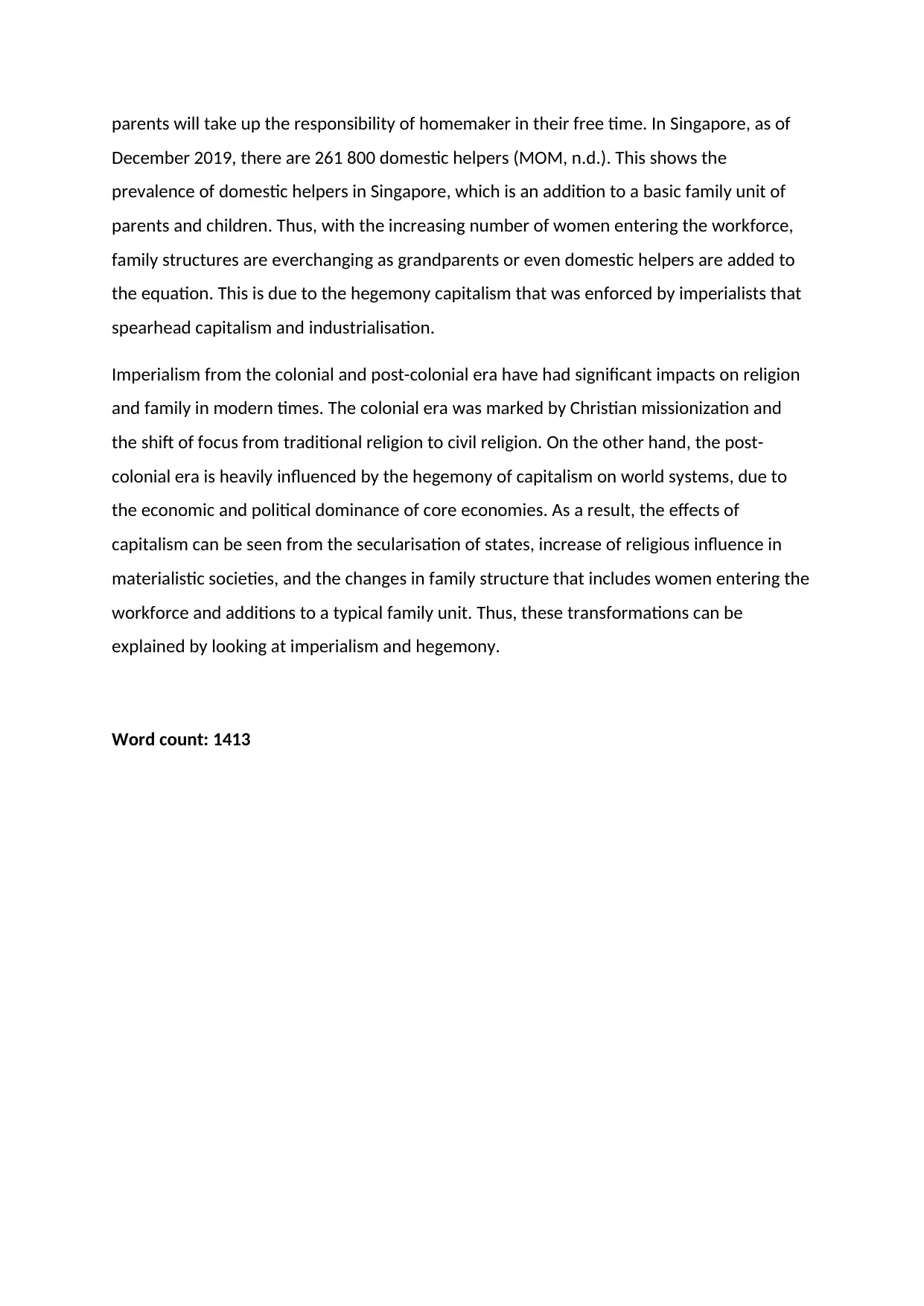
parents will take up the responsibility of homemaker in their free time. In Singapore, as of
December 2019, there are 261 800 domestic helpers (MOM, n.d.). This shows the
prevalence of domestic helpers in Singapore, which is an addition to a basic family unit of
parents and children. Thus, with the increasing number of women entering the workforce,
family structures are everchanging as grandparents or even domestic helpers are added to
the equation. This is due to the hegemony capitalism that was enforced by imperialists that
spearhead capitalism and industrialisation.
Imperialism from the colonial and post-colonial era have had significant impacts on religion
and family in modern times. The colonial era was marked by Christian missionization and
the shift of focus from traditional religion to civil religion. On the other hand, the post-
colonial era is heavily influenced by the hegemony of capitalism on world systems, due to
the economic and political dominance of core economies. As a result, the effects of
capitalism can be seen from the secularisation of states, increase of religious influence in
materialistic societies, and the changes in family structure that includes women entering the
workforce and additions to a typical family unit. Thus, these transformations can be
explained by looking at imperialism and hegemony.
Word count: 1413
December 2019, there are 261 800 domestic helpers (MOM, n.d.). This shows the
prevalence of domestic helpers in Singapore, which is an addition to a basic family unit of
parents and children. Thus, with the increasing number of women entering the workforce,
family structures are everchanging as grandparents or even domestic helpers are added to
the equation. This is due to the hegemony capitalism that was enforced by imperialists that
spearhead capitalism and industrialisation.
Imperialism from the colonial and post-colonial era have had significant impacts on religion
and family in modern times. The colonial era was marked by Christian missionization and
the shift of focus from traditional religion to civil religion. On the other hand, the post-
colonial era is heavily influenced by the hegemony of capitalism on world systems, due to
the economic and political dominance of core economies. As a result, the effects of
capitalism can be seen from the secularisation of states, increase of religious influence in
materialistic societies, and the changes in family structure that includes women entering the
workforce and additions to a typical family unit. Thus, these transformations can be
explained by looking at imperialism and hegemony.
Word count: 1413
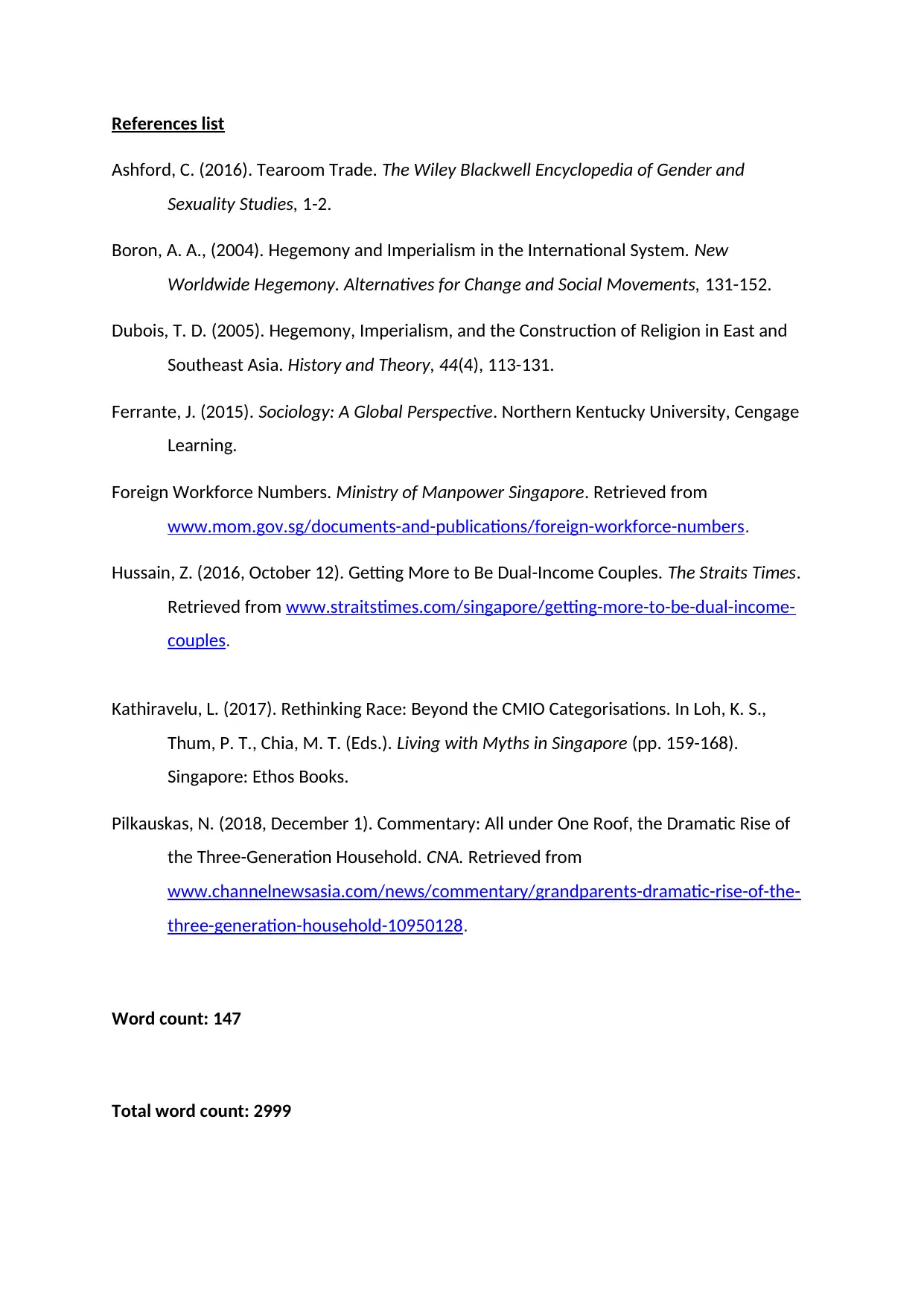
References list
Ashford, C. (2016). Tearoom Trade. The Wiley Blackwell Encyclopedia of Gender and
Sexuality Studies, 1-2.
Boron, A. A., (2004). Hegemony and Imperialism in the International System. New
Worldwide Hegemony. Alternatives for Change and Social Movements, 131-152.
Dubois, T. D. (2005). Hegemony, Imperialism, and the Construction of Religion in East and
Southeast Asia. History and Theory, 44(4), 113-131.
Ferrante, J. (2015). Sociology: A Global Perspective. Northern Kentucky University, Cengage
Learning.
Foreign Workforce Numbers. Ministry of Manpower Singapore. Retrieved from
www.mom.gov.sg/documents-and-publications/foreign-workforce-numbers.
Hussain, Z. (2016, October 12). Getting More to Be Dual-Income Couples. The Straits Times.
Retrieved from www.straitstimes.com/singapore/getting-more-to-be-dual-income-
couples.
Kathiravelu, L. (2017). Rethinking Race: Beyond the CMIO Categorisations. In Loh, K. S.,
Thum, P. T., Chia, M. T. (Eds.). Living with Myths in Singapore (pp. 159-168).
Singapore: Ethos Books.
Pilkauskas, N. (2018, December 1). Commentary: All under One Roof, the Dramatic Rise of
the Three-Generation Household. CNA. Retrieved from
www.channelnewsasia.com/news/commentary/grandparents-dramatic-rise-of-the-
three-generation-household-10950128.
Word count: 147
Total word count: 2999
Ashford, C. (2016). Tearoom Trade. The Wiley Blackwell Encyclopedia of Gender and
Sexuality Studies, 1-2.
Boron, A. A., (2004). Hegemony and Imperialism in the International System. New
Worldwide Hegemony. Alternatives for Change and Social Movements, 131-152.
Dubois, T. D. (2005). Hegemony, Imperialism, and the Construction of Religion in East and
Southeast Asia. History and Theory, 44(4), 113-131.
Ferrante, J. (2015). Sociology: A Global Perspective. Northern Kentucky University, Cengage
Learning.
Foreign Workforce Numbers. Ministry of Manpower Singapore. Retrieved from
www.mom.gov.sg/documents-and-publications/foreign-workforce-numbers.
Hussain, Z. (2016, October 12). Getting More to Be Dual-Income Couples. The Straits Times.
Retrieved from www.straitstimes.com/singapore/getting-more-to-be-dual-income-
couples.
Kathiravelu, L. (2017). Rethinking Race: Beyond the CMIO Categorisations. In Loh, K. S.,
Thum, P. T., Chia, M. T. (Eds.). Living with Myths in Singapore (pp. 159-168).
Singapore: Ethos Books.
Pilkauskas, N. (2018, December 1). Commentary: All under One Roof, the Dramatic Rise of
the Three-Generation Household. CNA. Retrieved from
www.channelnewsasia.com/news/commentary/grandparents-dramatic-rise-of-the-
three-generation-household-10950128.
Word count: 147
Total word count: 2999
1 out of 9
Related Documents
Your All-in-One AI-Powered Toolkit for Academic Success.
+13062052269
info@desklib.com
Available 24*7 on WhatsApp / Email
![[object Object]](/_next/static/media/star-bottom.7253800d.svg)
Unlock your academic potential
© 2024 | Zucol Services PVT LTD | All rights reserved.




